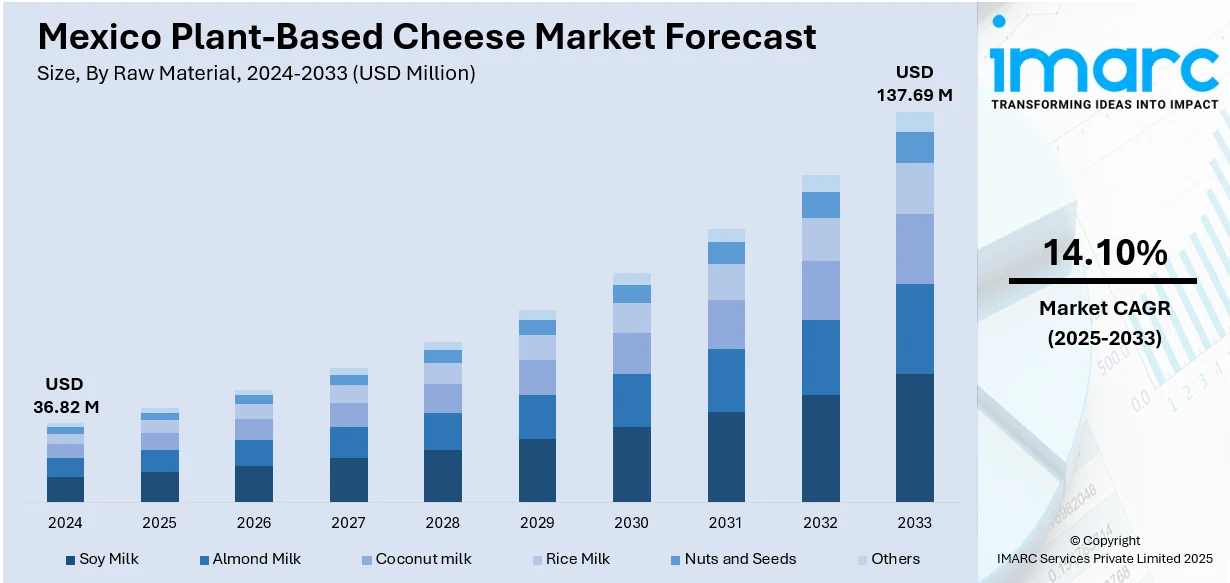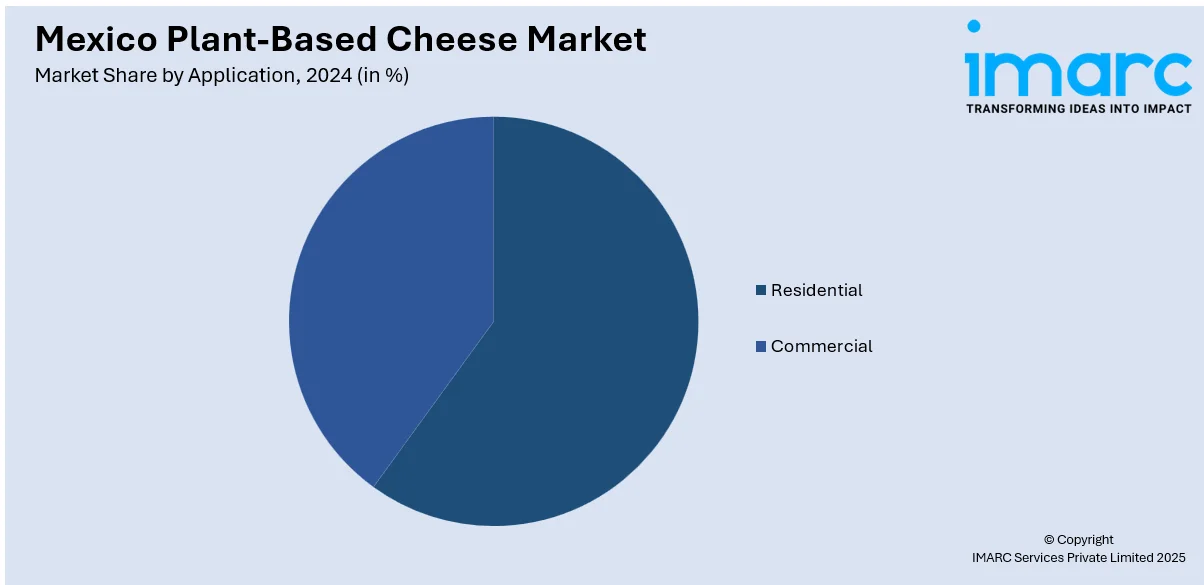
Mexico Plant-Based Cheese Market Size, Share, Trends and Forecast by Raw Material, Product Type, Application, Distribution Channel, and Region, 2025-2033
Mexico Plant-Based Cheese Market Overview:
The Mexico plant-based cheese market size reached USD 36.82 Million in 2024. Looking forward, IMARC Group expects the market to reach USD 137.69 Million by 2033, exhibiting a growth rate (CAGR) of 14.10% during 2025-2033. The growing interest in health, animal welfare, and sustainability is boosting market demand in Mexico. Urban consumers seek dairy-free options with authentic taste and texture. Innovative brands and expanding distribution through supermarkets and online channels are reshaping the competitive dynamics and driving broader acceptance across the country, strengthening the Mexico plant-based cheese market share.
|
Report Attribute
|
Key Statistics
|
|---|---|
|
Base Year
|
2024
|
|
Forecast Years
|
2025-2033
|
|
Historical Years
|
2019-2024
|
| Market Size in 2024 | USD 36.82 Million |
| Market Forecast in 2033 | USD 137.69 Million |
| Market Growth Rate 2025-2033 | 14.10% |
Mexico Plant-Based Cheese Market Trends:
Health Awareness and Lactose Intolerance
Health concerns are a major factor behind the rising demand for plant-based cheese in Mexico. Many consumers are lactose intolerant or sensitive to dairy, prompting a move toward dairy-free alternatives. Additionally, awareness of chronic health issues, such as obesity and heart conditions, has motivated people to seek food options that are lower in saturated fats and free from animal-derived ingredients. Plant-based cheese is often seen as a better option, especially when it includes added nutrients and avoids common allergens. As more people focus on nutrition and digestive health, plant-based cheese is gaining popularity not just among vegans but also among health-conscious consumers seeking a balanced and clean-label diet.

To get more information on this market, Request Sample
Environmental and Ethical Concerns
The growing concern for the environment and animal welfare is influencing food choices across Mexico, which is further boosting the Mexico plant-based cheese market growth. Consumers are becoming more aware that animal agriculture contributes to environmental problems such as water consumption, deforestation, and greenhouse gas emissions. In response, many are turning to plant-based products that have a lower environmental impact. Ethical concerns about animal treatment in industrial farming are also playing a role, with people seeking cruelty-free and sustainable alternatives. Plant-based cheese is viewed as both eco-friendly and ethically responsible, making it a strong choice for those looking to align their food habits with their values. This has helped drive the product’s increasing appeal beyond traditional vegan communities.
Innovation, Distribution, and Price Accessibility
Ongoing innovation in recipes and processing techniques has made plant-based cheese more appealing to a wider range of consumers in Mexico. By using ingredients like soy, coconut, almonds, oats, and cashews, manufacturers are developing alternatives that closely resemble the taste, texture, and melting qualities of dairy cheese. These improvements have helped overcome past perceptions of poor quality. In line with this, plant-based cheeses are becoming more visible across mainstream retail channels, supermarkets, convenience stores, online platforms, and even restaurants. Although pricing remains a concern for some consumers, growing competition and increased production are helping to gradually reduce costs. These advances in innovation and distribution are making plant-based cheese more mainstream and attainable.
Mexico Plant-Based Cheese Market Segmentation:
IMARC Group provides an analysis of the key trends in each segment of the market, along with forecasts at the country and regional levels for 2025-2033. Our report has categorized the market based on raw material, product type, application, and distribution channel.
Raw Material Insights:
- Soy Milk
- Almond Milk
- Coconut milk
- Rice Milk
- Nuts and Seeds
- Others
The report has provided a detailed breakup and analysis of the market based on the raw material. This includes soy milk, almond milk, coconut milk, rice milk, nuts and seeds, and others.
Product Type Insights:
- Mozzarella
- Parmesan
- Cheddar
- Others
A detailed breakup and analysis of the market based on the product type have also been provided in the report. This includes mozzarella, parmesan, cheddar, and others.
Application Insights:

- Residential
- Commercial
A detailed breakup and analysis of the market based on the application have also been provided in the report. This includes residential and commercial.
Distribution Channel Insights:
- Offline Stores
- Online Stores
A detailed breakup and analysis of the market based on the distribution channel have also been provided in the report. This includes offline stores and online stores.
Regional Insights:
- Northern Mexico
- Central Mexico
- Southern Mexico
- Others
The report has also provided a comprehensive analysis of all the major regional markets, which include Northern Mexico, Central Mexico, Southern Mexico, and others.
Competitive Landscape:
The market research report has also provided a comprehensive analysis of the competitive landscape. Competitive analysis such as market structure, key player positioning, top winning strategies, competitive dashboard, and company evaluation quadrant has been covered in the report. Also, detailed profiles of all major companies have been provided.
Mexico Plant-Based Cheese Market Report Coverage:
| Report Features | Details |
|---|---|
| Base Year of the Analysis | 2024 |
| Historical Period | 2019-2024 |
| Forecast Period | 2025-2033 |
| Units | Million USD |
| Scope of the Report |
Exploration of Historical Trends and Market Outlook, Industry Catalysts and Challenges, Segment-Wise Historical and Future Market Assessment:
|
| Raw Materials Covered | Soy Milk, Almond Milk, Coconut Milk, Rice Milk, Nuts and Seeds, Others |
| Product Types Covered | Mozzarella, Parmesan, Cheddar, Others |
| Applications Covered | Residential, Commercial |
| Distribution Channels Covered | Offline Stores, Online Stores |
| Regions Covered | Northern Mexico, Central Mexico, Southern Mexico, Others |
| Customization Scope | 10% Free Customization |
| Post-Sale Analyst Support | 10-12 Weeks |
| Delivery Format | PDF and Excel through Email (We can also provide the editable version of the report in PPT/Word format on special request) |
Key Questions Answered in This Report:
- How has the Mexico plant-based cheese market performed so far and how will it perform in the coming years?
- What is the breakup of the Mexico plant-based cheese market on the basis of raw material?
- What is the breakup of the Mexico plant-based cheese market on the basis of product type?
- What is the breakup of the Mexico plant-based cheese market on the basis of application?
- What is the breakup of the Mexico plant-based cheese market on the basis of distribution channel?
- What is the breakup of the Mexico plant-based cheese market on the basis of region?
- What are the various stages in the value chain of the Mexico plant-based cheese market?
- What are the key driving factors and challenges in the Mexico plant-based cheese market?
- What is the structure of the Mexico plant-based cheese market and who are the key players?
- What is the degree of competition in the Mexico plant-based cheese market?
Key Benefits for Stakeholders:
- IMARC’s industry report offers a comprehensive quantitative analysis of various market segments, historical and current market trends, market forecasts, and dynamics of the Mexico plant-based cheese market from 2019-2033.
- The research report provides the latest information on the market drivers, challenges, and opportunities in the Mexico plant-based cheese market.
- Porter's five forces analysis assist stakeholders in assessing the impact of new entrants, competitive rivalry, supplier power, buyer power, and the threat of substitution. It helps stakeholders to analyze the level of competition within the Mexico plant-based cheese industry and its attractiveness.
- Competitive landscape allows stakeholders to understand their competitive environment and provides an insight into the current positions of key players in the market.
Need more help?
- Speak to our experienced analysts for insights on the current market scenarios.
- Include additional segments and countries to customize the report as per your requirement.
- Gain an unparalleled competitive advantage in your domain by understanding how to utilize the report and positively impacting your operations and revenue.
- For further assistance, please connect with our analysts.
 Request Customization
Request Customization
 Speak to an Analyst
Speak to an Analyst
 Request Brochure
Request Brochure
 Inquire Before Buying
Inquire Before Buying




.webp)




.webp)












